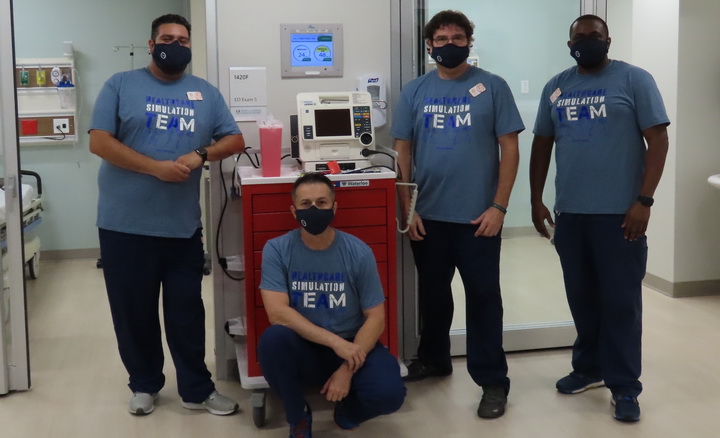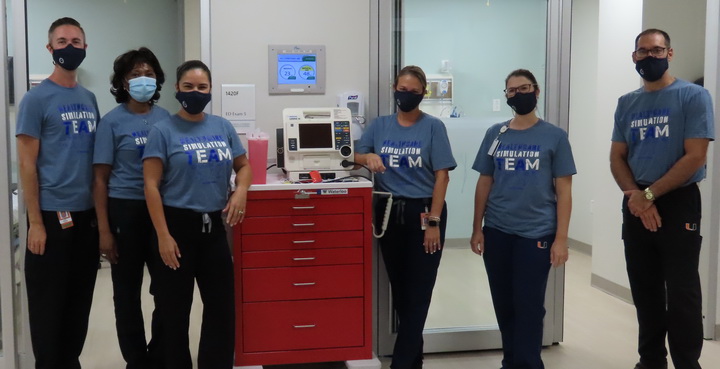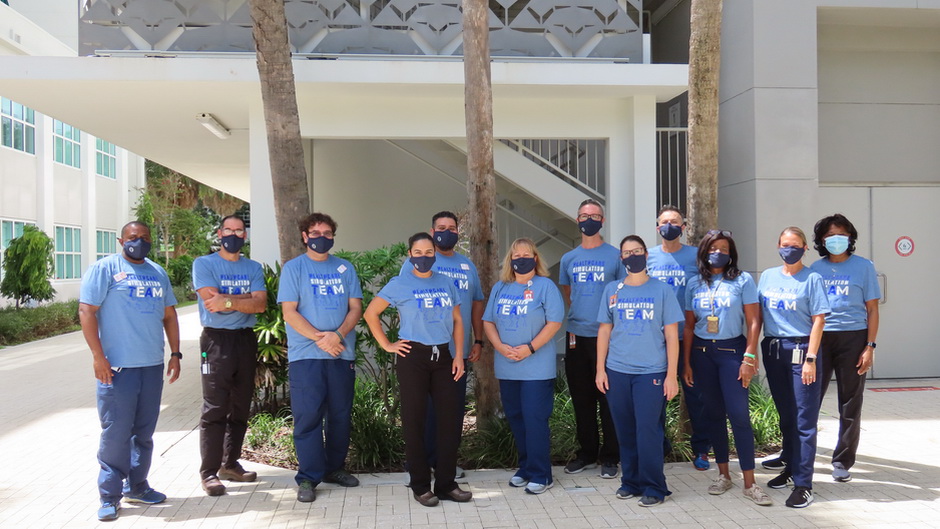As a firefighter/paramedic, Luis Perez helped save lives. As a simulation technologist, he brings learning to life for hundreds of students weekly at the Simulation Hospital Advancing Research and Education (S.H.A.R.E.™). Six years in, Perez calls his job of helping prepare nurses to hit the ground running “fun, innovative, and rewarding.” So rewarding, in fact, he’s now studying to be a nurse himself.
For Perez and his S.H.A.R.E.™ colleagues, every week is simulation week. A day at the office might involve acting out mystery ailments as a standardized patient, monitoring control rooms, creating batches of real-looking blood and Hollywood-worthy wounds for disaster preparedness scenarios, setting up suturing stations for skills labs, hooking up high-tech medical equipment, and prepping prototypes for research. And that’s just before lunch.
“The best part of being at S.H.A.R.E.™ is working with the team of techs and nursing specialists we have,” says Perez. “It’s a fun group that comes from different backgrounds of health care and technology, and this combination of knowledge makes us a very complete team.”
Sponsored annually by the Society for Simulation in Healthcare (SSH), Healthcare Simulation Week raises awareness about the profession and celebrates those working in it to improve the safety, effectiveness, and efficiency of health care delivery through education, practice, and research. To help kick off this year's worldwide event, September 14 to 20, Perez and his coworkers gathered for their annual group photo, decked out in new 2020 sim week T-shirts.
This year, in particular, the team has plenty to celebrate. As associate dean for simulation programs, Donna McDermott coordinates simulation activity throughout the 41,000-square-foot S.H.A.R.E.™. When COVID-19 kept students from returning to campus in March, the S.H.A.R.E.™ team’s already multifaceted work became much more involved. They had to pivot quickly to create virtual scenarios, translate simulation activities to Zoom, and incorporate strict social distancing and safety protocols. During that same intense period, notes McDermott, they also helped S.H.A.R.E.™ achieve simulation teaching and education accreditation status from SSH.
In addition to pulling together sim week’s team photo, McDermott is a presenter in SSH’s Healthcare Simulation Week Expert Webinar, “Volatility, Uncertainty, Complexity, Ambiguity: It’s a VUCA World Now: How Is Simulation Coping?” She described how the S.H.A.R.E.™ team has managed to keep simulation activities flowing seamlessly throughout the pandemic. “I am proud of what the S.H.A.R.E.™ staff has accomplished together,” she says. “Our team worked collaboratively to create contingency simulated activities, supplemented with commercial virtual simulation products, that are helping our students meet their clinical learning objectives during a critical time for preparing the next generation of nurses to practice.”
“We have an amazing team!” agrees nurse practitioner Michelle Arrojo, D.N.P. ’19, a nurse specialist educator who earned her doctorate degree at SONHS. “We have always worked well together, and that’s even more true now with some of the added work of keeping the hospital clean and ready for the students who come to campus.
Evan McEwing, a lecturer at SONHS and nurse specialist educator at S.H.A.R.E.™, points out at least one positive of the COVID-19-necessitated protocols for social distancing. “Smaller groups are ideal for skill acquisition,” he explains. “It affords the opportunity for one-to-one instruction and feedback.”
Now more than ever, simulation-based education is integral to helping SONHS students continue honing critical nursing practice, diagnostic reasoning, and interprofessional communications skills in a range of areas, such as adult health, acute care, anesthesia nursing, health assessment and promotion, and pediatric health, to name a few.
“I have experienced that students are very grateful we’re open and that they’re able to learn their skills,” says sim technologist Omar Hernandez. “They’re happy and very appreciative of everything we’ve done for them so far.”
Those students make all of the creative problem-solving worthwhile for Perez, the former paramedic. “The students love being back and doing the hands-on part of their programs,” he says. “You can see their excitement.” It’s that excitement that tells Perez he’s doing his job—sim week, and every week.



